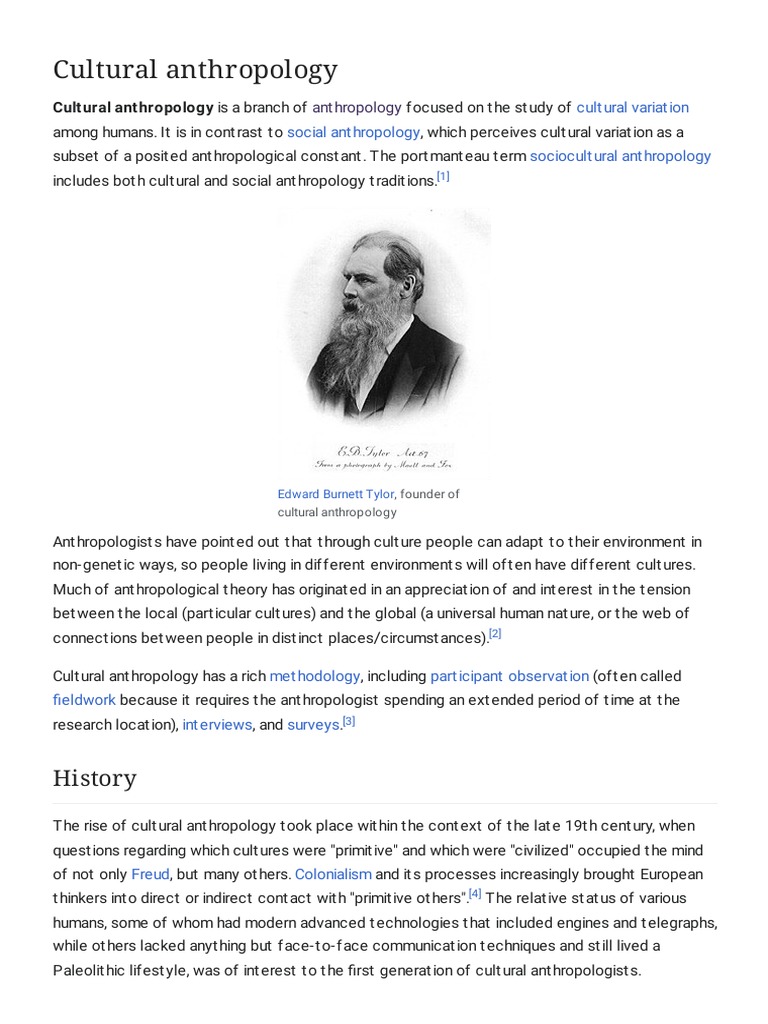Cultural anthropology, as a discipline, offers profound insights into the complex tapestry of human societies, particularly through the lens of cultural relativism. This perspective posits that cultures must be understood on their own terms, devoid of ethnocentric biases. At its core, culture encompasses the myriad ways in which humans interpret their existence, shape their environments, and forge social connections. Through this exploration, one can discern not only a spectrum of behaviors and norms but also the deeper undercurrents that inform the development of each unique culture. This article will elucidate the definition of culture within the realm of cultural anthropology and how cultural relativism enhances our comprehension of human societies.
To embark on this discourse, it is crucial to define “culture.” In anthropological parlance, culture refers to the collective beliefs, values, practices, symbols, and material artifacts that characterize a particular group. This definition encapsulates both the tangible elements, such as tools and architecture, and the intangible aspects, such as language, art, and rituals. While culture is often taken for granted in daily life, it represents a complex system of meaning that shapes individual and collective identities.
One common observation among anthropologists is the striking diversity of cultures across the globe. This diversity manifests in the vast array of languages spoken, culinary practices, dress styles, and religious beliefs. It is tempting, however, to frame this diversity within a hierarchical framework, suggesting some cultures are superior to others. Such an ethnocentric viewpoint can lead to misconceptions and oversimplifications about the beliefs and practices of others. Cultural relativism challenges this notion, arguing instead that we must strive to understand cultural phenomena within their specific contexts. By doing so, we unearth the rationale behind cultural practices that might, at first glance, appear perplexing or even irrational.
Cultural relativism holds significant implications for anthropological study and human interaction. It invites practitioners to engage in empathetic understanding, fostering dialogues that respect and appreciate differences rather than vilifying them. When examining cultural practices, such as marriage customs or dietary restrictions, it becomes essential to recognize the historical and socio-political contexts that underpin these phenomena. For instance, understanding the role of family dynamics in arranged marriages requires a nuanced exploration of the values surrounding kinship and social cohesion within a given society.
The fascination with cultural anthropological perspectives often stems from the realization that behavior is not merely a product of individual choices but is profoundly influenced by cultural contexts. This understanding gives rise to a theoretical framework known as “cultural determinism,” which posits that culture substantially shapes individual behavior. While it is crucial to acknowledge the interplay between culture and individual agency, the importance of cultural influences cannot be understated. Thus, the anthropological inquiry turns our attention to the shared systems of meaning that transcend individual experience.
Exploration of culture inevitably leads to an inquiry into the concept of identity. Identity is profoundly intertwined with culture, with individuals often defining themselves through their cultural affiliations. This duality can manifest in various forms, such as ethnic identity, national identity, or religious identity. A critical examination of cultural identity brings forth discussions about power dynamics and the ways in which dominant cultures may marginalize or appropriate elements from minority cultures. The recognition of these dynamics is essential for promoting cultural sensitivity and fostering social justice.
Moreover, the impact of globalization on cultural practices further complicates the anthropological landscape. The rapid interconnectedness of the world through technology and commerce can lead to cultural homogenization, where dominant cultures overshadow local traditions. Yet, within this phenomenon lies a paradox; globalization can also facilitate the cross-pollination of ideas and practices, enriching cultures rather than erasing them. Anthropologists must navigate these complexities, analyzing the fluidity of culture in the face of external influences while remaining attuned to the resilience of local customs.
In considering culture from a relativistic standpoint, it becomes imperative to engage with the ethical dimensions of cultural representation. Cultural anthropologists wield significant influence over how cultures are portrayed and understood. This responsibility necessitates a commitment to ethical practice, ensuring that representations honor the voices and experiences of those within the culture. Engaging with local communities in collaborative ways not only promotes ethical anthropology but also enriches the research process by infusing it with genuine perspectives and insights.
As cultural anthropologists delve deeper into the labyrinth of human societies, it becomes evident that culture is a living, breathing entity. It evolves and adapts in response to internal and external pressures, reflecting the needs and desires of its members. This dynamic nature of culture serves as a reminder that while we strive to catalogue and categorize, the fluidity of human experience resists simplification. Through the lens of cultural relativism, we gain an appreciation for the myriad ways in which individuals within diverse societies navigate their worlds, developing intricate systems of meaning that echo their histories and aspirations.
Ultimately, by adopting a cultural relativistic approach, anthropologists can contribute to meaningful cross-cultural dialogues that transcend superficial differences. In doing so, they foster a deeper understanding of humanity’s shared experiences while celebrating the unique expressions of culture that define us all. The pursuit of knowledge in cultural anthropology not only satiates our curiosity but also cultivates empathy and a profound recognition of our interconnectedness. As we journey through the rich landscape of human cultures, we emerge with a more nuanced comprehension of the delicate balance between universality and particularity that defines the human experience.
